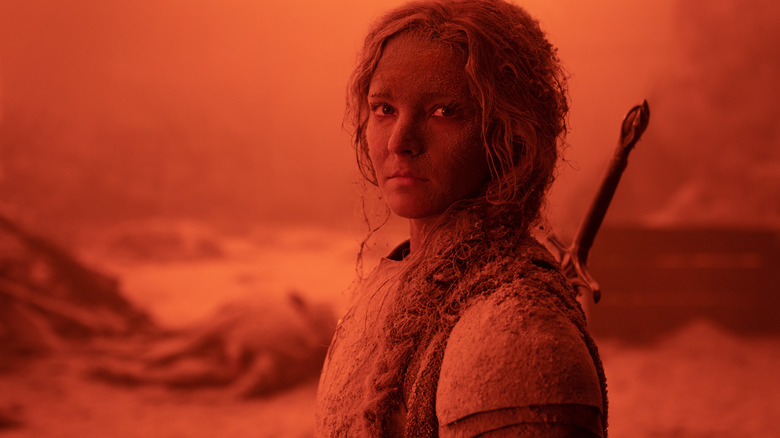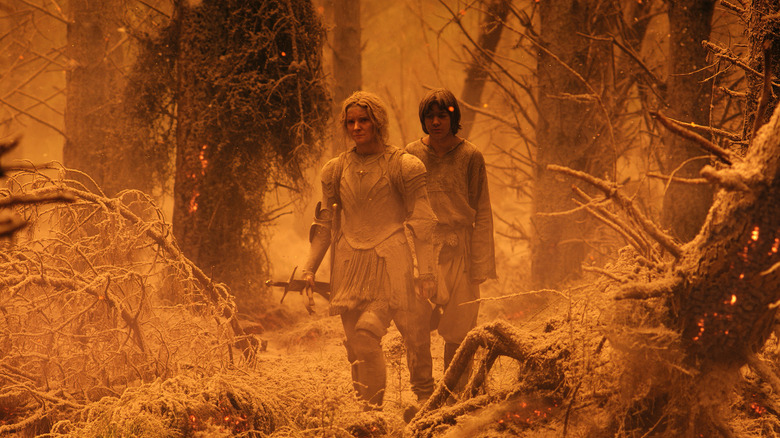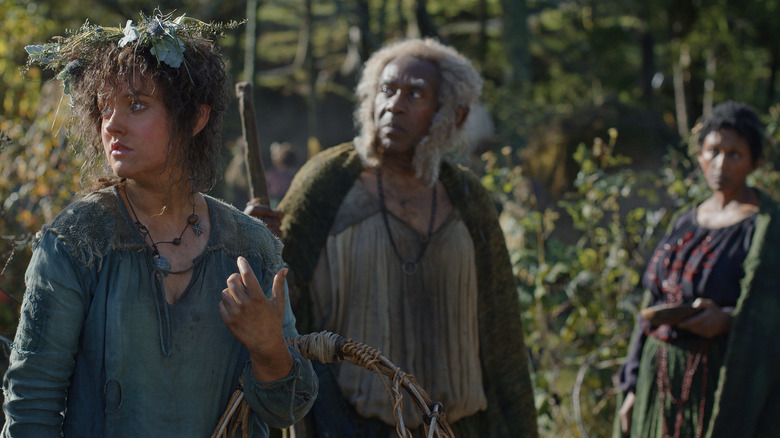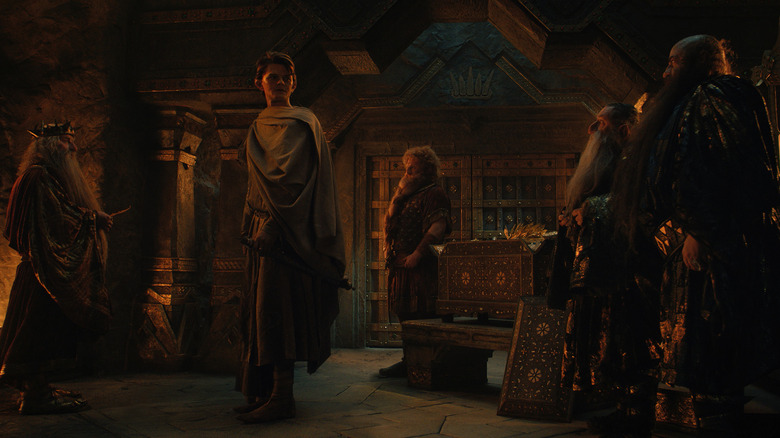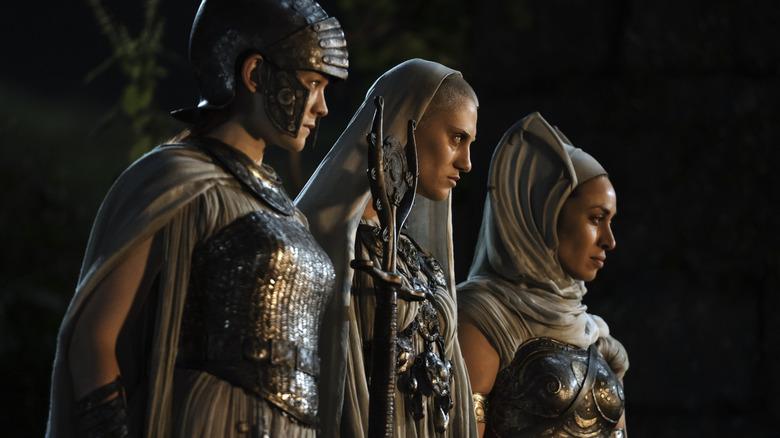The Lord Of The Rings: The Rings Of Power Hits Pause And Takes A Deep Breath Before The Plunge In 'The Eye'
This might seem like an odd question to raise so late in this first season of "The Lord of the Rings: The Rings of Power," but have you ever asked yourself why exactly this story is being told as a streaming series instead of a movie? The practical answer, of course, goes back to the parameters of the rights that Amazon Studios originally purchased. But creatively speaking, what is it about the sprawling tale of Galadriel (Morfyyd Clark), Elrond (Robert Aramayo), Adar (Joseph Mawle) and his war in the Southlands, the harfoots, and all the rest that lends itself to episodic adventures as opposed to another series of big-screen epics?
In every major studio's rush to fill their coffers with streaming "minutes viewed" and increased subscription numbers, we've had to endure eyeroll-worthy talking points and fundamental misunderstandings about how countless limited series are actually more like "six-hour movies" — a statement that all but erases the advantages the very different medium has to offer in the first place.
Thus far, "The Rings of Power" has avoided most of the traps that ensnare so many other titles by embracing its own episodic nature, maintaining a deliberate sense of pacing, and even cutting down on storylines during certain weeks to focus on those that need to take precedence. It hasn't been entirely smooth sailing, as some hours have felt a little more strained than others, but between last week's game-changing "Udûn" and now last night's episode titled "The Eye," this series has shown off some of the best it has to offer. After the thrill-a-minute action of episode 6, the penultimate hour of this first season eases off the gas pedal entirely in ways that almost makes this feel like a table-setting finale for season 2.
Let's dig into what works, what doesn't, and what lies in store for us in next week's season conclusion.
Picking up the pieces
After last week's cliffhanger left the fates of Galadriel, Halbrand (Charlie Vickers), Queen Míriel (Cynthia Addai-Robinson), the Númenorean army, and the Southlanders all up in the air, I'll admit I approached episode 7 with some concern over whether credited writer Jason Cahill and director Charlotte Brändström would opt to skip over resolving this storyline altogether. It would've been a justifiable (if frustrating) creative choice to save the meatiest arc for what will surely be a show-stopping finale next week, to be fair, but thankfully it takes no time at all to return us to the devastation wrought by Adar, his orcs, and the traitorous Southlander Waldreg (Geoff Morrell) after the violent eruption of what turns out to be Mount Doom.
In the opening moments of the episode, the camera lingering on prone corpses, animals on fire, and more horrific imagery that emphasizes the true cost of war. In fact, few situations test the mettle of characters better than an unexpected, soul-crushing defeat at the last minute. With victory within grasp and this dark period in Middle-earth looking more promising than ever, Galadriel and the rest of our heroes instead have been forced to lick their wounds, accept the magnitude of their failure, and figure out how to move forward.
The chaos of the eruption provides a perfect excuse to experiment with brand-new character pairings, giving us the inspired dynamic between Galadriel and young Theo (Tyroe Muhafidin). Unsurprisingly, throwing the oldest and most experienced warrior in the ensemble together with the youngest character pays off remarkably well, uncovering new layers between two individuals who've wrestled with dark impulses in their own way. The guilt-ridden Galadriel led countless allies to the slaughter in her stubborn insistence to return to Middle-earth from Númenor, while the wayward Theo who assumes all his closest friends and family are dead and similarly bears responsibility for the calamity.
In their surprisingly moving conversations that follow, the episode lays bare its central idea of making peace with mistakes and finding the will to go on.
No good deed goes unpunished
Where last week's "Udûn" exclusively followed the characters directly involved in the battle in the Southlands, the structure of episode 7 splits itself rather evenly between the fiery aftermath of the volcanic eruption, the continuing journey of Nori (Markella Kavenagh) and the harfoots on their seasonal migration, and Elrond and Durin (Owain Arthur) as they attempt to recruit the dwarves' help to save all elfkind from a dark fate. This trio of storylines remain in thematic lockstep thanks to some clever parallels between characters who are forced to confront the unintentional fallout of good deeds seemingly gone awry.
As jarring as the transition is from the fire and brimstone of the Southlands to the invigorating greens surrounding the harfoots, even this stretch of story comes with the encroaching specter of evil as their precious grove, the endpoint of their migration in the first place, appears to have been damaged by volcanic ejecta from the disaster down south. Suspicion for this disturbing omen immediately falls on the Stranger (Daniel Weyman), whose behavior in his recent appearances have pointed towards increasingly sinister origins. Any hopes that the mysterious character might not be what he appears to be seem dashed when his attempts to heal a burnt fruit tree ends with Nori and her sister almost crushed by a falling branch. Cast out by village elder Sadoc (Lenny Henry), the situation with the Stranger and the frightening appearance of the hooded figures who burn the harfoots' wagons cause Nori to retreat into self-doubt, chastising herself for ever bothering to help in the first place when all it ever led to was misery for herself and those she loves.
That sense of regret carries over to the dire situation in the Southlands as survivors flee the ash-covered disaster zone. In a noticeable echo of Nori's own words, Elendil (Lloyd Owen) can't help but lash out at himself for rescuing Galadriel from the Sundering Seas — a choice that ultimately led to their crushing defeat, the blinding of Queen Míriel, and what seems like certain death for his missing son, Isildur (Maxim Baldry). Once Theo joins the pity party by heaping blame on himself for giving away the broken sword hilt, Galadriel's speech about the good intentions of the heart neatly links each ongoing thread — including that of Durin and Elrond at Khazad-dûm.
Looking ahead
The last remaining subplot carries perhaps the most significant development for the long-term future of the series, pertaining to Durin and Elrond's requests for the king's (Peter Mullan) help with his life-saving mithril. This is flatly turned down despite the dwarf's heartfelt pleas to save his friend's people, but just as the elf sadly accepts his fate and the two share a bittersweet farewell, a surprisingly effective demonstration of some leftover mithril curing a leaf afflicted with the pernicious "blight" restores some hope that they can convince the king ... if only they can dig out the rest of the mithril. Yet when the two embark on their effort to break through to the larger deposit of mithril ore hidden deep below the mountain, the king's discovery of their actions results in the expulsion of Elrond from the kingdom, Durin finally challenging his father's fitness to wear the crown, and the final note between Durin and his wife Disa (Sophia Nomvete) looking ahead to when they'll eventually wield power for themselves.
The falling-out between Durin and his father, by far the episode's most emotionally-charged exchange, precedes the string of hopeful resolutions that close out the rest of the episode.
Back among the harfoots, the grove shockingly begins to bloom once more, which Nori and Poppy (Megan Richards) interpret as the Stranger's mysterious magic having actually healed the trees and surrounding area. Buoyed by her father Largo's (Dylan Smith) impromptu speech amid their backbreaking cleanup efforts, reaffirming the harfoots' commitment to each other and their humble lot in life, Nori seizes the initiative and announces her intentions to go after the Stranger to warn him of the evil-looking figures hot on his trail. In the Southlands, the arrival of Galadriel and Theo leads to their reunions with Arondir (Ismael Cruz Córdova), Bronwyn (Nazanin Boniadi), and Halbrand — along with Míriel recommitting herself to the war effort in partnership with Galadriel's elves, despite Elendil's anguished protests.
By the time Adar closes out the episode by officially taking over the desolate wastes — now officially retitled from the Southlands to Mordor — the stage is set for wherever the finale will take us. The battle is over, the victory by Adar and his orcs feels definitive, and our heroes scattered hopelessly across Middle-earth have no choice but to regroup and live to fight another day.
Riddles in the dark and other stray thoughts
- Stranger Things: Okay, so despite my potentially premature alarmism a few weeks back, we're back on the bandwagon that the Stranger might not be so bad after all, right? As harmful as his magic might be to others in his immediate vicinity, it's not too much of a stretch to interpret this as an all-powerful figure who simply doesn't have much control over his own faculties just yet. We're right back to square one, as far as figuring out his exact identity is concerned, if you ask me. One interesting little reveal, however: Sadoc indicates that the constellation of stars the Stranger is looking for hasn't been seen for over a thousand years, further hinting at his age and possibly a previous appearance — in some form or another — in Middle-earth.
- Greenwood the Great: This may only receive greater attention in the finale and season 2 afterwards, but Sadoc casually mentions that the Stranger can seek out the "big folk" settlement on the other side of "Greenwood the Great," a distant forest not too far from the harfoots' grove. Those who know their Tolkien should recognize this as the former name of Mirkwood, the forest that will eventually become the home of famous elves like Legolas in the Third Age. At this point, the forest hasn't yet fallen under the sway of Sauron (then known as the Necromancer) during the time period "The Hobbit" takes place, leading to dark forces moving in that necessitates the name change to something much more ominous.
- Galadriel's Grief: In one of Galadriel's conversations with Theo, the two bond over the kin they've lost to orcs over the years. The elf mentions her brother Finrod (who perished in his quest to defeat Sauron in the premiere, though he was oddly never actually named until now) and also her husband Celeborn. This episode adds the interesting wrinkle that her long-lost love has been missing since he went off to war years prior. That would be a pretty major deviation from canon, seeing how this character was portrayed by Marton Csokas in "The Fellowship of the Ring" alongside Cate Blanchett's Galadriel, but it's worth keeping an eye on this subplot in future seasons. Bonus fun observation: Theo's look of horror at the idea of Galadriel dancing in a glade as she recalls her first meeting with Celeborn.
- Dwarven Secrets: Tolkien nerds everywhere, this one was for you! While Durin and Elrond pause their backbreaking efforts to find the mithril deposit, their conversation turns to the obscure lore that dwarves pick secret names for themselves that outsiders never get to hear uttered. In fact, their entire language of "Khuzdul" is kept top-secret, meaning it's a huge deal that Elrond took the time to learn some of their language and doubly so when Durin comes this close to revealing his real "inner name" to Elrond.
